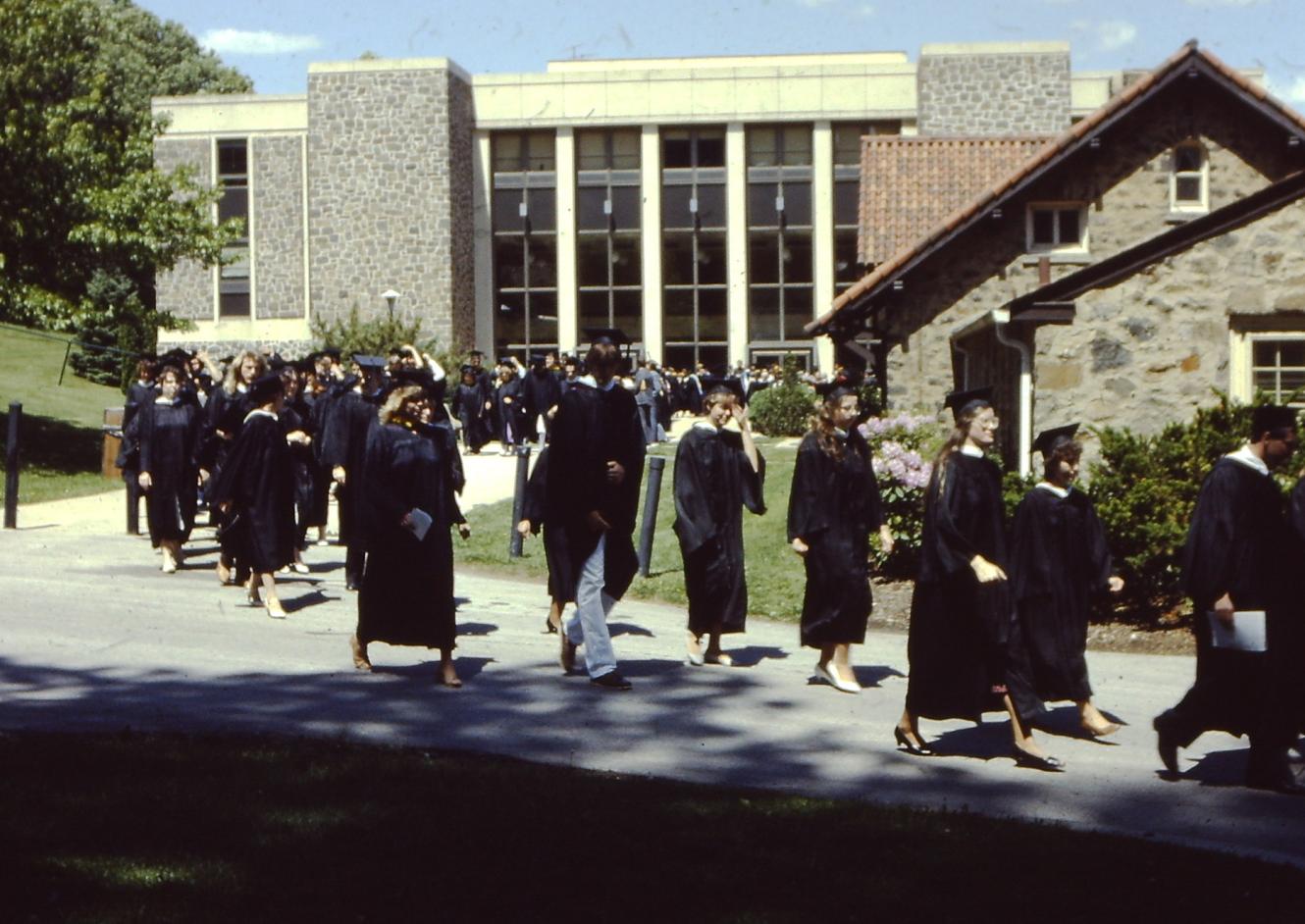

From its inception, Eastern University's MBA program was designed to break new ground. Launched in the early 1980s, the program was both a response to emerging educational needs and a deliberate step toward innovation. The vision was clear: to equip future leaders with the business skills necessary to not only succeed in a rapidly changing world but to transform it. What began as a bold step in academia has since become a legacy brimming with innovation and continually evolving to meet the demands of an ever-changing world.
The 1980s were a time of significant transformation and bold new directions for Eastern University (known at the time as Eastern College: A Baptist Institution.) The school was proactively adapting and expanding its academic programs to meet the shifting educational needs of society. In 1982, this commitment led to the launch of Eastern’s first graduate-level degree: the Master of Business Administration (MBA).
This groundbreaking program was approved and signed into action by Dr. Daniel E. Weiss, President of the Seminary and College from 1973-1981. Jean B. Kim, Academic Dean, and Linwood T. Geiger, Chairman of the Department of Economics and Business Administration were also early supporters of the program. Geiger was a primary driver behind the initiative, having written the original proposal in 1980, alongside the avid support of Edward H. Pauley, Vice President and Academic Dean of the College, who sent letters to the Department of Education seeking approval.
In the original memorandum from Dr. Pauley to President Weiss, he wrote: “The one argument that Lin has hammered away at with the greatest persistence is that of timing. His point is that no one else on the Main Line is currently offering an MBA and that no other Christian College in the country (as far as he knows) is offering one. We have a chance to be the first and to reap whatever benefits accrue to getting out of the gate before the rest of the pack.”
"The MBA program was born out of a vision to equip people with the business skills necessary to make a meaningful impact, particularly on a global scale,” says Jean Kim, Academic Dean at the time. “Advocates for the program, including Tony Campolo ’56, BD ’60, ThM ’61, HD ’06, saw a need to prepare individuals to help communities—both locally and abroad—improve their economic well-being. What began as an extension of that idea grew into a full-fledged MBA program, combining strong business education with Christian values. It was, and continues to be, a powerful way to develop leaders who seek to serve with both purpose and business expertise."
The launch of the MBA marked a pivotal moment for Eastern, ushering in a new era of academic expansion and institutional progress, and laying the groundwork for years of future innovation.
The original program required 36 credits and featured six foundational courses and eight required core courses that covered topics spanning accounting, economics, finance, marketing management, ethics, and more. Some of the original electives available to students included Income Tax Accounting, Money and Banking, Human Behavior and Organizational Theory, and many more. The program provided a rigorous foundation that helped graduates advance their careers, launch businesses, and impact the world.
During the 1980s, business became one of the most sought-after degrees in higher education. As technological advances, globalization, and corporate expansion reshaped the business landscape, Eastern recognized the growing need for robust leadership and business education.
Today, Eastern University's MBA in Organizational Management stands as a beacon of transformative, convenient, and accessible education. Delivered 100% online, the dynamic, accessibly-priced program has opened the door to an advanced degree, regardless of circumstances or background, with the potential for an attractive return on investment. According to GMAC’s Corporate Recruiters Survey, in 2021, the average starting salary for workers with an MBA was between 22 and 40 percent higher than for bachelor’s degree holders, underscoring the degree’s strong financial payoff and long-term career value in today’s competitive market.
Accredited by the Accreditation Council for Business Schools and Programs (ACBSP) in 2019, Eastern’s MBA equips graduates with the knowledge, business acumen, and strategic mindset necessary to lead successful teams in high-performing organizations. Students learn how to become effective, ethical users of artificial intelligence (AI) in a business setting and gain hands-on experience through innovative simulations. Originally launched with only two concentrations in Public Policy and Health Administration, the program has since expanded to offer students the opportunity to tailor their learning experience with concentrations in Business Analytics, Healthcare Administration, Global Sustainable Development, Marketing, or Project Management, with additional concentrations launching soon.
“As a first-generation student, pursuing my MBA at Eastern University was not just about advancing my career—it was about proving to myself that I was capable of more than I had ever imagined,” says MBA alumna Caitlyn Marshall ’19, MBA ’24. “Through hands-on assignments, thought-provoking projects, and a diverse variety of learning materials, I gained a deeper understanding of the complexities behind business decisions, sharpened my leadership skills, and evolved into a more effective servant leader. My MBA gave me the confidence and foundation to contribute more meaningfully to my organization and empowered me to pursue opportunities I once thought were beyond my reach.”
Notably, Eastern's MBA has been recognized by Philadelphia Business Journal, U.S. News & World Report, Discover Business, and more. As the program continues to grow, with over 3,000 students actively pursuing an MBA in Spring 2025, its mission remains the same: to empower leaders who will shape the future of business with integrity and purpose, while keeping faith, reason, and justice at the forefront of their actions.

